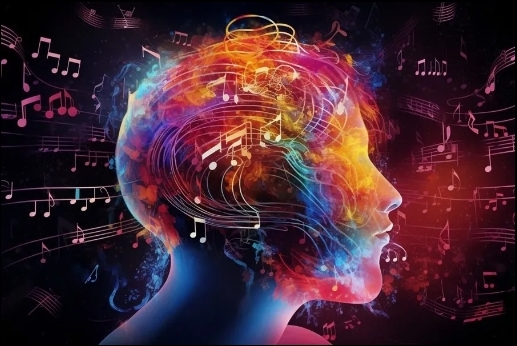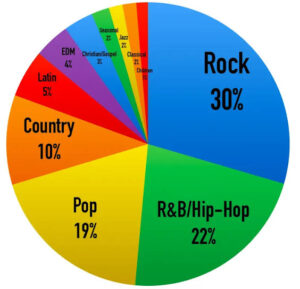
Music’s profound influence on our emotional state is a well-established phenomenon, Music has long been known to have a powerful impact on mood, and research has shown that it can have both psychological and neurological effects backed by scientific research. The impact of music on our mood is multifaceted, affecting both our psychological and neurological well-being.
The following are some of the key effects of music:
1. Positive emotions
Listening to music has the incredible ability to evoke a wide range of positive emotions within us. As we immerse ourselves in our favorite tunes, we may feel a surge of happiness, joy, excitement, and pleasure. This emotional response is often linked to the release of dopamine, a vital neurotransmitter in our brain that plays a crucial role in experiencing pleasure and reward.
When we listen to music that resonates with us, our brain rewards us by releasing dopamine, which creates a sense of pleasure and enjoyment. This can lead to feelings of euphoria, elation, and even a sense of ecstasy. The release of dopamine also reinforces our desire to continue listening to music, as our brain associates it with a pleasurable experience.
The positive emotions evoked by music can have a profound impact on our well-being and mental health. They can help alleviate symptoms of anxiety and depression, improve our mood, and even reduce stress levels. By tapping into the power of music, we can experience a natural high, boosting our mood and overall sense of happiness.
Moreover, the emotional connection we make with music can create lasting memories and associations, making it an integral part of our emotional landscape. So, let’s embrace the joy of music and allow ourselves to be swept away by its uplifting and pleasurable effects!
Listening to music can evoke positive emotions such as happiness, joy, excitement, and pleasure. This is often attributed to the release of dopamine, a neurotransmitter associated with pleasure and reward, in the brain.
2. Stress reduction
Music’s stress-reducing properties are a welcome respite for our frazzled nerves. By immersing ourselves in soothing melodies, we can effectively lower cortisol levels, the hormone responsible for stress. This natural stress relief leads to a profound sense of relaxation, calming the mind and alleviating anxiety and tension.
As music washes over us, our body’s “fight or flight” response is tempered, replaced by a sense of serenity and tranquility. Our mind, once racing with worries, begins to unwind, letting go of pent-up stress and anxiety. The calming effects of music create a peaceful atmosphere, shielding us from life’s chaos and promoting a sense of balance and well-being.
By reducing cortisol levels, music helps mitigate the harmful effects of chronic stress on our physical and mental health. Our blood pressure decreases, heart rate slows, and our immune system strengthens. Music’s stress-reducing properties also improve our mood, helping us navigate life’s challenges with greater ease and resilience.
In essence, music offers a natural stress-management tool, accessible to anyone, anywhere. So, let’s embrace the calming power of music and find solace in its soothing embrace, allowing ourselves to relax, unwind, and rejuvenate our minds and bodies.
Music has been found to be an effective stress reducer, reducing levels of the stress hormone cortisol in the body. It can promote relaxation and have a calming effect on the mind, helping to alleviate anxiety and tension.
3. Mood regulation
Music can influence and regulate our moods, helping us to cope with and change our emotional states. It can provide an outlet for expressing and processing emotions, making us feel understood and validated. It’s impact on mood regulation is a powerful tool for emotional well-being. By listening to music that resonates with our emotional state, we can:
- Process and express emotions: Music provides a healthy outlet for emotional release, helping us make sense of our feelings and gain clarity.
- Shift emotional states: Music can transport us from a negative mood to a more positive one, offering a mental escape and mood boost.
- Find validation: Music’s lyrics and melodies can mirror our emotions, making us feel
4. Memory and nostalgia
Music’s link to memory and nostalgia is a profound phenomenon, tapping into the deep recesses of our mind. When we hear a song from our past, it can instantly transport us back in time, evoking a flood of memories and emotions associated with that moment. This nostalgia-tinged experience is rooted in the brain’s processing of music and memory.
Research shows that music is stored in multiple areas of the brain, including those responsible for emotion, memory, and cognition. When we hear a familiar song, our brain retrieves the associated memories and emotions, recreating the experience. This phenomenon is known as the “reminiscence bump,” where music from our past is more easily recalled and emotionally resonant.
The nostalgia evoked by music can:
- Evoke vivid memories: Songs can bring back detailed recollections of people, places, and events from our past.
- Trigger emotional responses: Nostalgic feelings can range from joy and happiness to sadness and longing.
- Create a sense of continuity: Music connects our past to our present, providing a sense of coherence and stability.
- Provide comfort and solace: Nostalgic music can offer a comforting escape from the present, providing a sense of security and familiarity.
The powerful connection between music, memory, and nostalgia makes it a unique and personal experience, allowing us to relive and reinterpret our past through the soundtrack of our lives.
5. Enhanced focus and concentration
Certain types of music, such as instrumental or ambient music, can improve focus and concentration. It can provide a rhythmic and structured background that helps to block out distractions and increase productivity. Music’s impact on focus and concentration is a significant benefit for individuals seeking to enhance their productivity and mental clarity. Certain types of music, like instrumental or ambient genres, possess a unique ability to:
- Create a conducive environment: Music sets the tone for a productive atmosphere, fostering a sense of calmness and minimizing distractions.
- Provide a rhythmic structure: The rhythmic patterns in music organize our thoughts, promoting a sense of order and coherence.
- Block out distractions: Music’s consistent beat and melody help mask background noise, allowing us to focus on the task at hand.
- Increase mental clarity: By reducing mental chatter and promoting a clear mind, music enables us to concentrate more effectively.
- Boost productivity: With improved focus and concentration, music helps us complete tasks more efficiently and with greater accuracy.
The benefits of music on focus and concentration are especially evident in:
- Instrumental music: Without lyrics, instrumental music minimizes distractions and allows the mind to focus.
- Ambient music: Soft, calming ambient sounds create a peaceful environment, ideal for concentration.
- Lo-fi music: Soft, calming sounds and melodies help create a focused atmosphere.
By harnessing the power of music, individuals can optimize their focus, concentration, and productivity, leading to greater success in both personal and professional endeavors.
6. Empathy and connection
Music’s capacity to foster empathy and connection is a profound aspect of its emotional resonance. By sharing emotional experiences and themes through music, we can:
- Relate to others: Music provides a common ground, allowing us to connect with others who share similar emotions and experiences.
- Understand different perspectives: Music offers a window into the experiences and emotions of others, promoting empathy and compassion.
- Feel a sense of belonging: Shared musical experiences create a sense of community and belonging, transcending individual differences.
- Process emotions together: Music provides a safe space for collective emotional processing, fostering a sense of shared understanding.
- Break down barriers: Music’s universal language bridges cultural, social, and personal divides, connecting us across our differences.
This empathetic connection through music:
- Strengthens social bonds
- Enhances emotional intelligence
- Fosters a sense of unity and shared human experience
- Provides comfort and solace in difficult times
- Celebrates our diversity and individuality
By sharing emotional experiences through music, we can deepen our understanding of others and ourselves, cultivating a more empathetic and connected world.
Music has the ability to foster feelings of empathy and connection with others. Listening to music with shared emotional themes or experiences can create a sense of belonging and understanding.
7. Mood elevation and motivation
Upbeat and energetic music can boost mood and motivation, increasing feelings of optimism and enthusiasm. It can provide a sense of energy and drive, influencing physical activity and performance. Music is a powerful tool for enhancing our mental and physical well-being. Upbeat and energetic music has the ability to:
Boost mood: Elevate our mood by releasing endorphins, also known as “feel-good” hormones.
Increase motivation: Inspire us to take action, pursue goals, and overcome challenges.
Enhance optimism: Foster a positive outlook, encouraging us to approach life with enthusiasm and hope.
Provide energy and drive: Increase our physical and mental energy, propelling us to engage in physical activity and tackle tasks with vigor.
Influence physical performance: Improve exercise performance, speed, and endurance by synchronizing movement with music’s rhythm and beat.
Reduce fatigue: Alleviate physical and mental exhaustion, replacing it with a sense of revitalization and rejuvenation.
Promote a sense of accomplishment: Enhance our sense of achievement and pride in our endeavors.
By harnessing the energizing effects of music, we can:
- Improve our mental health and well-being
- Enhance our physical performance and exercise routine
- Increase our productivity and focus
- Develop a more positive and optimistic outlook on life
Upbeat and energetic music serves as a potent motivator, empowering us to tackle challenges, pursue our passions, and live a more vibrant and fulfilling life.
From a neurological perspective, music affects various areas of the brain
1. The amygdala, which plays a role in processing emotions, is activated when listening to music, contributing to the emotional response.
2. The hippocampus, responsible for memory formation, is stimulated by music, explaining its ability to evoke memories and nostalgic feelings.
3. The prefrontal cortex, involved in decision-making and emotional regulation, is engaged when listening to music, allowing for mood regulation and emotional processing.
4. The reward system, involving the release of dopamine, is activated in response to pleasurable music, creating feelings of happiness and enjoyment.
Overall, music has a profound impact on mood, and its effects can be observed both psychologically, through the experience and expression of emotions, and neurologically, through the activation of specific brain regions involved in emotion processing and reward.





